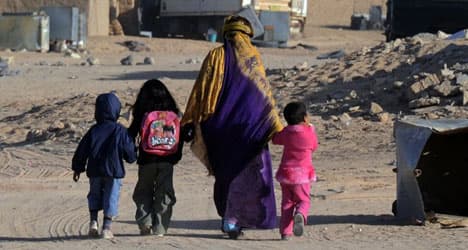Spain loses asylum seeker deportation battle

The European Court of Human Rights ruled on Tuesday that Spain could not go ahead with plans to deport 30 Sahrawi asylum seekers from the Western Sahara because Spanish authorities had failed to properly hear their claims.
The immigrants claim that they fled the Gdeim Izik refugee camp in the territory of Western Sahara, a former Spanish colony annexed by Morocco in 1975, after it was forcibly dismantled by the Moroccan police, according to a Council of Europe press release.
They arrived on makeshift boats on the coast of Spain's Canary Islands in 2011 and lodged applications for international protection.
These were rejected after being considered twice by the Spanish Minister of the Interior who ordered their deportation.
Seeking a stay of execution for their deportation orders, they applied in January 2011 for a judicial review and Spain's National Court ordered a provisional suspension of the procedure for their removal.
This would allow the court to thoroughly examine their allegations about the risks they would face if they were returned to Morocco.
But the following day, the court rejected the asylum seekers' application for a stay of execution.
The asylum seekers then turned to the European Court of Human Rights (EHCR).
They claimed that they had been subjected to ill-treatment by the Moroccan authorities because of their Sahrawi origin and that they would feel threatened in the event of their return.
The immigrants alleged they had been physically assaulted and that some of their family members had been sexually assaulted or tortured by police officers.
In the findings of the hearing, the court noted that the asylum-seekers' fears "did not seem irrational" and noted that "because of the expedited nature of the proceedings, the applicants had not had the opportunity to provide any further explanations on these points".
The EHCR found unanimously that there had been a violation of Article 13 (right to an effective remedy) and Articles 2 (right to life) and 3 (prohibition of inhuman or degrading treatment).
The court held that Spain "was to ensure that the applicants remained within its territory while their cases were being examined, pending a final decision by the domestic authorities on their applications for international protection".
Don't miss stories about Spain, join us on Facebook and Twitter.
Comments
See Also
The immigrants claim that they fled the Gdeim Izik refugee camp in the territory of Western Sahara, a former Spanish colony annexed by Morocco in 1975, after it was forcibly dismantled by the Moroccan police, according to a Council of Europe press release.
They arrived on makeshift boats on the coast of Spain's Canary Islands in 2011 and lodged applications for international protection.
These were rejected after being considered twice by the Spanish Minister of the Interior who ordered their deportation.
Seeking a stay of execution for their deportation orders, they applied in January 2011 for a judicial review and Spain's National Court ordered a provisional suspension of the procedure for their removal.
This would allow the court to thoroughly examine their allegations about the risks they would face if they were returned to Morocco.
But the following day, the court rejected the asylum seekers' application for a stay of execution.
The asylum seekers then turned to the European Court of Human Rights (EHCR).
They claimed that they had been subjected to ill-treatment by the Moroccan authorities because of their Sahrawi origin and that they would feel threatened in the event of their return.
The immigrants alleged they had been physically assaulted and that some of their family members had been sexually assaulted or tortured by police officers.
In the findings of the hearing, the court noted that the asylum-seekers' fears "did not seem irrational" and noted that "because of the expedited nature of the proceedings, the applicants had not had the opportunity to provide any further explanations on these points".
The EHCR found unanimously that there had been a violation of Article 13 (right to an effective remedy) and Articles 2 (right to life) and 3 (prohibition of inhuman or degrading treatment).
The court held that Spain "was to ensure that the applicants remained within its territory while their cases were being examined, pending a final decision by the domestic authorities on their applications for international protection".
Don't miss stories about Spain, join us on Facebook and Twitter.
Join the conversation in our comments section below. Share your own views and experience and if you have a question or suggestion for our journalists then email us at [email protected].
Please keep comments civil, constructive and on topic – and make sure to read our terms of use before getting involved.
Please log in here to leave a comment.